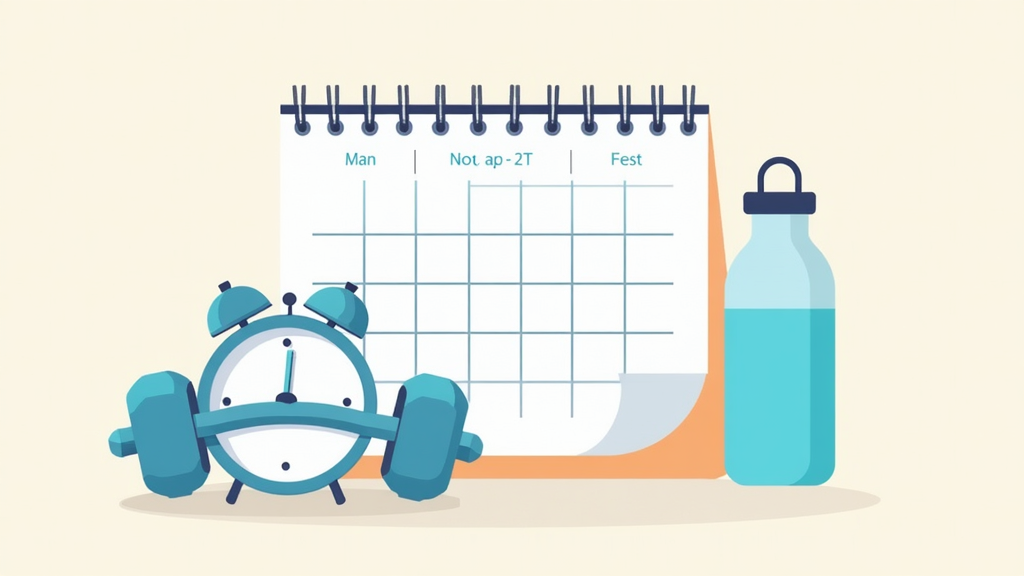Figuring out the best time to work out can be more challenging than sticking to the routine itself. There’s a lot of talk about early sessions being better, but it turns out that the “right” time really depends on what you want to achieve. Whether that’s building muscle, losing fat, improving your endurance, or just keeping workouts convenient, it varies. I’ve tried different routines myself, and there’s something to be said for timing your workouts to fit your personal goals and lifestyle.

Why Workout Timing Matters for Different Fitness Goals
Most people hit the gym when it best fits their schedule, and honestly, fitting exercise in wherever you can is always better than skipping it. However, if you’re chasing specific results—like gaining strength, burning more fat, or boosting your mood—timing makes a difference. Studies have shown that your body temperature, hormone levels, and even how alert you feel changes throughout the day, and these can all affect performance and results.
The science behind training at different times comes down to your body’s natural rhythms, called circadian rhythms. Morning people (sometimes called “larks”) might feel like superheroes before breakfast, while “night owls” often find their energy peaks late in the day. Matching your workouts to when your body feels the strongest or most energetic tends to give the best results for both performance and consistency. These rhythms don’t just impact how awake you are. They play a tangible role in muscle function, metabolism, and even motivation. Tuning into when you naturally feel ready to move is a simple way to step up your training without extra effort.
Morning Workouts: Benefits and Best Goals
Morning sessions have a lot of fans, and not just because you can check “gym” off your to-do list early. Here’s how morning workouts stack up for different exercise goals:
- Fat Loss: Fasted cardio, when you work out before breakfast, has been shown in some studies to help burn more fat. Your body is more likely to tap into stored energy after a night without food, which might give weight loss efforts a little boost.
- Consistency: Morning exercisers are known for sticking to their routines better. I find getting it done before the day gets busy really helps with consistency.
- Boosted Mood and Energy: Exercise wakes up your body and helps set a positive tone for the day. There’s also an early spike in cortisol and testosterone, which helps with focus and strength first thing in the morning.
Just keep in mind you might feel a bit stiffer or less strong right after waking up. A solid warm-up is especially important in the morning to get the blood flowing and boost performance safely.
Beyond physical benefits, starting your day with a workout can build a sense of achievement. Completing a session early sets you up to face challenges throughout the day with more confidence and a clearer head.
Afternoon and Evening Workouts: Perks and Who They’re Best For
Lifting in the afternoon or squeezing in a run at sundown might fit your life better and isn’t something to avoid. Here’s how late-day workouts can benefit you, depending on your goals:
- Strength and Muscle Gains: Your body temp peaks between 2 pm and 6 pm. This means muscles are warmer and you’re less likely to get injured. Some research suggests people perform best, lifting heavier, running faster, and even building more muscle, later in the day when reaction time and flexibility are up.
- Performance: Athletes often compete late in the day. Research finds that training at a similar time preps the body for peak performance when it counts.
- Stress Relief: Exercising after work offers a great way to shed stress from your day. I often use evening workouts as my personal “off switch” to unwind.
The potential downside is that night workouts too close to bedtime can sometimes affect sleep quality, especially if you do high-intensity training. To avoid this, I try to finish up at least a couple of hours before hitting the pillow. If you love evening workouts but have trouble winding down, try switching up your routine to add calming activities like gentle stretching or yoga instead of vigorous cardio or heavy lifting.
Some people find they have more social opportunities in the gym after typical work hours. Training in the evenings may give you access to more group classes or make it easier to find a workout buddy, adding some fun and accountability to your regimen.
The Science: How Your Body Clock Affects Your Workout
Your internal clock (circadian rhythm) influences not just how awake or tired you feel, but how your body handles exercise. Here’s how these rhythms shape your training:
- Body Temperature: Warmer muscles in the afternoon mean joints are more flexible and risk of injury goes down. This is one reason athletes often break personal bests later in the day.
- Hormones: Testosterone, closely related to muscle growth, is highest in the morning. Cortisol, the “stress hormone,” is also highest then, which can support energy use and fat burning.
- Alertness: Concentration is usually better in the late morning and late afternoon.
The time you choose can even impact your perceived effort. Studies have shown that workouts in the evening can feel easier, even when you’re working just as hard. That can help you push further, making evening sessions great for taking up a notch your performances.
Personal energy levels make a pretty big difference. If you’re a total night owl, training at dawn just feels wrong and might be harder to keep up. I always recommend folks listen to their bodies and try slots that match their natural energy swings. On the flip side, morning people often find late workouts zap their motivation or energy to finish strong.
Quick Guide: Matching Your Workout Time to Your Fitness Goals
If you want really good results, here’s a simple breakdown for matching your training time with your main goal:
- Fat Loss: Morning, especially before breakfast, might help with fat burning. Just make sure you don’t feel lightheaded and eat soon after.
- Building Strength and Muscle: Late afternoon or early evening can help push heavier weights and recover faster. Your body is physically ready to perform harder in these hours.
- Boosting Performance (Running, Sports): Schedule tougher training sessions or skills drills for when your energy naturally peaks—which for many is between 4 pm and 6 pm.
- Reducing Stress and Improving Mood: Evening exercise helps wind down after a busy day and can help with sleep (as long as you finish early enough).
- Just Staying Consistent: The best time is when you’re actually going to do it. Consistency matters way more than squeezing every last advantage out of timing.
If you’re still not sure, I recommend trying out two or three different times for a couple of weeks each. Most people notice one slot feels easier to stick to (and more enjoyable!) pretty quickly. Track how you feel after each session and jot down notes on mood, energy, and even how you sleep that night.
Practical Tips for Picking and Sticking With Your Workout Time
Life gets busy, and perfect timing isn’t always possible. A few simple tips can help you pick a slot and stick with it long enough to feel the difference:
- Block your workout time in your calendar like any other appointment.
- Prepare your gear the night before to avoid excuses in the morning.
- Have a backup slot; if you miss your usual time, fit it in later in the day or even during lunch.
- Notice your energy patterns and work with them instead of against them—maybe there’s a 20-minute window mid-afternoon you can take advantage of.
- Don’t beat yourself up if you have to change things occasionally; one missed workout isn’t the end of progress. Flexibility keeps your motivation high and turns fitness into a lifestyle, not a chore.
Finding community support can make it easy to establish your chosen routine. Whether online or in person, joining groups or telling friends about your workout plans adds social accountability and a bit of fun competition.
Important Factors Outside of Timing: Nutrition, Sleep, and Routine
Workout timing plays a role, but there’s more to think about for hitting your goals:
- Nutrition: For morning workouts, a light snack like a banana or piece of toast might help energy without feeling heavy. If you train in the evening, try to eat something with protein and carbs about one to two hours before so you’re fueled up. Remember to rehydrate after any session, especially if it’s hot or particularly sweaty.
- Sleep: Regular sleep keeps your energy and recovery on track. Switch your workout time if you notice it’s making you too wired to sleep after. For the best recovery, aim for seven or more hours most nights and try to wind down with relaxation techniques after late workouts.
- Total Routine: The most progress happens when your workout fits into a routine you can keep up for months, not days. Don’t stress over getting everything “perfect.” Just keep moving and stack up those small wins. Consistency in your nutrition, rest, and exercise is what makes results happen over time.
Frequently Asked Questions
Question: Can working out at night impact sleep?
Answer: It can for some people, especially with high-intensity workouts. If you find it hard to wind down, try aiming for a session earlier in the evening or stick to lighter activity like stretching or walking before bed. If sleep struggles persist, experiment with different times or lower your workout intensity.
Question: Is fasted cardio really better for fat loss?
Answer: There’s a slight boost in fat burning with fasted cardio, but total calories burned and diet matter much more for weight loss. Pick the time that feels best and fits your life. Consistency with both your diet and exercise is what really sets you up for lasting results.
Question: What matters most: time of day or sticking to a routine?
Answer: Consistency is way more important than workout timing. Training at the same time can help make it a habit, but flexibility is key. Choose what works for your schedule and you’re way more likely to keep it up over the long run.
Takeaway: Your Best Workout Time is Personal
Choosing the best time to work out really depends on your main goals, your schedule, and when you feel most energized and motivated. Listen to your body, test out different times, and find what sticks. Whether it’s sunrise sprints or night time yoga, what matters most is getting it done and feeling good about it. Keep things flexible, let your routine grow with your needs, and remember that showing up—no matter the hour—is the real win for your health and happiness. Thanks for checking this post out feel free to to leave a comment, ask questions and be sure to look on the other posts for everything fitness.
